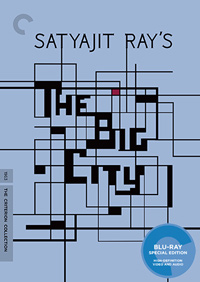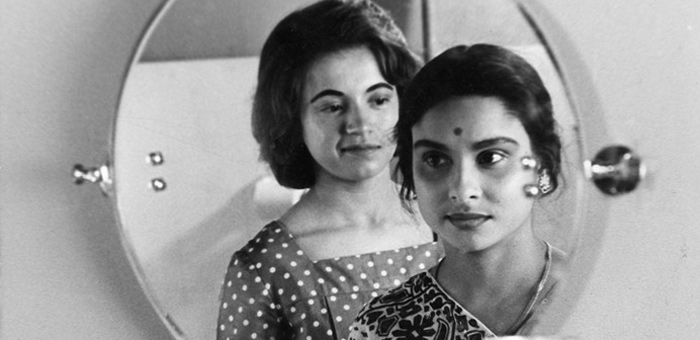
Married to her bank-clerk husband Subrata (Anil Chatterjee), housewife Arati (Madhabi Mukherjee) cares for their five year old son Pintu, sharing their living space with Subrata’s elderly parents, Priyagopol (Haren Chatterjee) and Sarojini (Sefalika Devi) and fourteen year old sister, Bani (Jaya Bhaduri). Living, sometimes precariously, between Subrata’s checks, Arati discovers that the wife of one of Subrata’s friends has joined the work force to help support her family, which inspires Arati to consider doing the same. At first reluctant to agree to such a radical idea, as Subrata explains that he is as conservative as his ex-school teacher father and adheres jokingly to the English saying that “a woman’s place is in the home,” it’s clear to him that economic necessity is making Arati’s idea lucrative.
Also afraid that her attractiveness will cause trouble in male dominated offices, they being to pore over employment advertisements in the newspaper, a process that is thrillingly secret to both of them, for if Subrata’s parents were to get a whiff of this, there would likely be discord. An posting searching for smart, beautiful women to apply sees Arati being offered a job selling door-to-door knitting machines to housewives, and, sure enough, divulging her employment status to Priyagopol and Sarojini causes the in-laws to engage in the silent treatment, whilst the five year old Pintu rebels furiously against the absence of his mother, placated momentarily by toys she is able to buy with her salary.
While Arati excels as a saleslady, she begins to further develop her own identity, and befriends an Anglo-Indian co-worker, Edith (Vicky Redwood). Subplots on the home front involving Subrata’s growing jealousy at his wife’s success (not to mention some own employment troubles of his own), and Priyagopol’s dabbling with begging successful ex-students for money due to the anger he has over Arati’s employment, become constant stressors. An incident occurs that forces Arati to make a decision, one that may potentially be a detriment to her family’s well-being.
Disc Review
Criterion has assembled a delightful package for The Big City (when will they get their hands on the Apu Trilogy?) and the newly restored 2K digital film transfer is ravishing, to say the least. A 2013 interview with Madhabi Mukherjee is a notable highlight as she explains her working relationship with Ray and how when she watched his cinema she finally understood that it’s a medium where words are secondary. Also included is a 1974 documentary short from B.D. Garga in which we get to hear Ray himself explains his methods (he professed to love every aspect of the filmmaking process) and a 2013 interview with Ray scholar Suranjan Ganguly called Satyajit Ray and the Modern Woman, which, paired with the booklet insert featuring an essay from Chandak Sengoopta are quite informative dissections of Ray’s motifs. However, most impressively is the inclusion of Ray’s 1965 film, The Coward (also known as Kapurush: Coward), which once again stars Mukherjee as well as a returning role for Soumitra Chatterjee. Technically, The Coward isn’t quite a short film as it is referred to here, with a running time of 74 minutes (Ray’s films are usually at least two hours), but it was originally released theatrically on a double bill with Ray’s The Holy Man. Whatever the classification, it’s a remarkable chance to see a lesser known Ray title.
Final Thoughts
Ray collaborator Subrata Mitra, who lensed many of the director’s titles, establishes pristine shot compositions in The Big City, starting with an opening sequence that announces the film’s urban setting with its busy streets and tramcars. We’re treated to many close-ups of the central family here, the expressive Mukherjee dominating the screen as Arati in a performance that is comical, moving, and engaging. As we meet the family, the value of women is quickly addressed in relation to Subrata’s teenage sister, still studying in school. Her brother asks when she’s going to stop that and learn how to become a housewife (his own wife managed to complete at least one year of college). Bani responds that she’s concurrently studying Domestic Science. But even though he’s nitpicky and condescending, Subrata isn’t ever shown as being disrespectful to his supportive wife. In fact, we see their relationship strengthen as they bond over her successful entrance into the work force, even if Subrata is slowly nagged by his jealous thoughts.
The Big City’s richly observed characters are remarkably relatable and its subject matter, though set in a particular time and place, feels as surprisingly resonant as it is relevant. Ray, who wrote the screenplay and music as well, expertly examines an impressive amount of issues, including the treatment of the Anglo-Indian in modern society, the children of British and Indian unions that were treated as people of lesser value on both sides. While Mukherjee would return as the lead in Ray’s next feature, Charulata, which is also a compelling look at a woman’s place and options, it is with The Big City that he creates an even more resonant concoction of visual artistry and subtle commentary.
